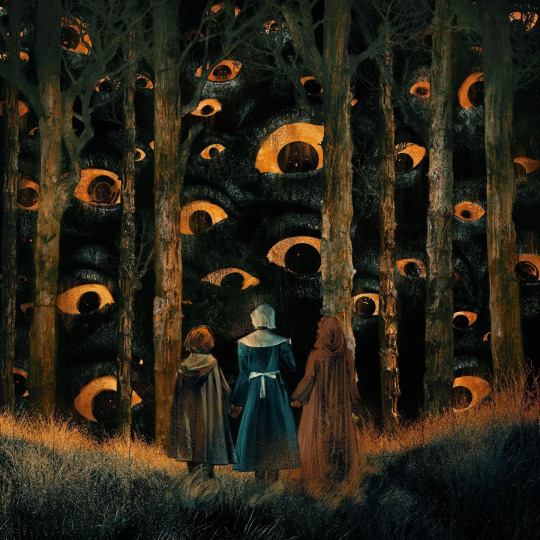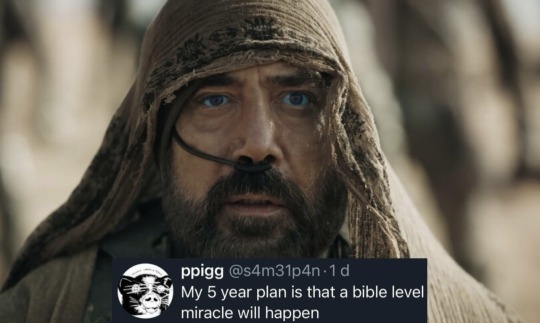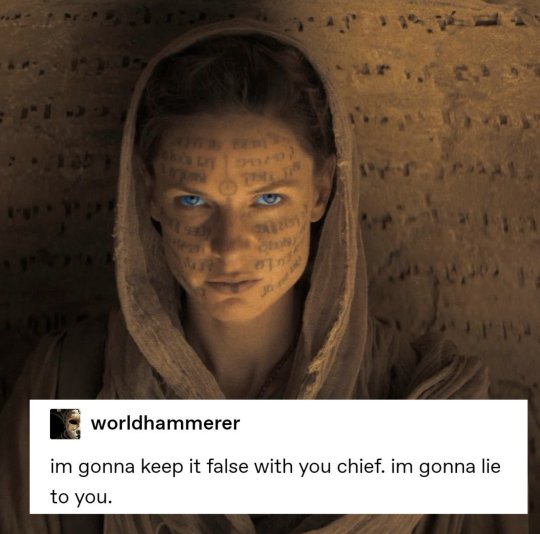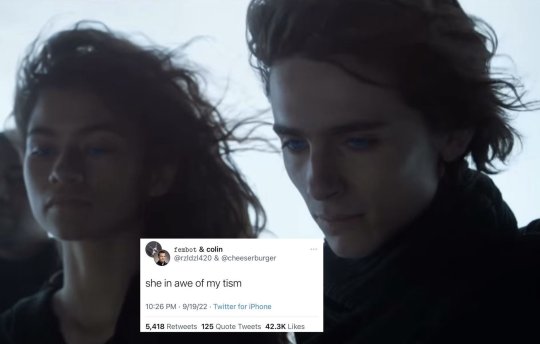Don't wanna be here? Send us removal request.
Text
Hello Tumblr, it's been a while. Once again I find the specters of literary analysis haunting my blood screaming for release, and you are my favorite void in which to scream. Today we're taking a departure from Dune to talk about some thoughts regarding the horror genre and why I think It really knocks it out of the park.
Famous racist H.P. Lovecraft in his essay Supernatural horror in fiction asserts that the earliest human emotion is fear and the oldest fear is that of the unknown.
I largely agree with what Lovecraft is getting at here that the unknown is the key to eliciting a feeling of fear, even if the primacy of an emotion having to do with age feels weird. Please, Tumblr, understand that I do not share his opinions regarding the Chinese, but the guy was among the first to pick apart the horror genre to find out what made it tick.
Lovecraft's expression of fear of the unknown is decidedly dated, even aside from the bigotry. His writing is famously full of 'Dear reader I dare not describe what I beheld' sort of stuff. It's even more diminished in the public eye by the fact anyone with internet access has a very clear image of Cthulhu as being like a squid dragon as depicted in the sculptures in its eponymous story despite once they actually find the thing and run a boat into it it's like some geometry violating cloud thing.
The thing I do appreciate about Lovecraft is that he's never actually under any compunction to explain anything. Polaris starts with the line 'I am a scholar of the Pnakotic Manuscripts' and that's all we really get. There's an economy of words here in letting us know the narrator is an academic and the subject of his studies is something with an unholy assembly of consonants suggesting it is very strange. In Call of Cthulhu everything we know about the cult and its intentions is communicated by the phenomenally unreliable character of Cesar, who shines a light on the global scale of the operation, fleshing out the worldbuilding while only leaving us with more questions.
Now I'm not breaking any new ground by singing the praises of Stephen King. Dude's far from perfect, and his idiosyncratic style makes all sorts of people just bounce right off, but I think It is probably the best example in the public eye of this 'fear of the unknown' thing in practice. See, for King 'nightmare' is not just a word you use to describe a scary situation. In a nightmare, you feel like there's some hidden logic to the world you can't quite understand. There's a terrible sense of foreboding that preceeds the terror because our brains are familiar with that script. Even if something isn't implicitly awful, there is a pervasive wrongness that our subconscious latches onto.
So lemme just take a second to underline the fact that a clown in a sewer is really fucking bizarre. Like yeah, we're 40 years out from the Tim Curry movie and it's ingrained into the public concious, but please do your best to imagine your response to a sewer clown in an Itless universe. It is important to dispell the whole 'Oh yeah, that old chestnut, the sewer clown' to establish how totally surreal this famous scene actually is.
The thing I think is the real masterstroke is the line 'We all float down here. You'll float too!' Nowhere in the book do we have any inclination of what the fuck that means. There is a threat implicit to it; whatever future Pennywise has planned is not gonna be good, but it's not like there's anything implicitly wrong with floating. The story prominently involves a toy boat, several sinister balloons, a semi-aquatic clown monster, and moments of disconnectedness from reality. If you're a ginormous nerd, you'll know that in the Stephen King Multiverse, the nightmare that manifests as Pennywise is trapped between realities, 'floating' in a gloaming space. There are many floating things, but there's no real explanation. Rather than being point blank 'The thing is impossible' like Lovecraft does, we're given a box of puzzle pieces that seem like they make a complete picture and the slowly dawning realization none of them actually fit together.
2 notes
·
View notes
Text
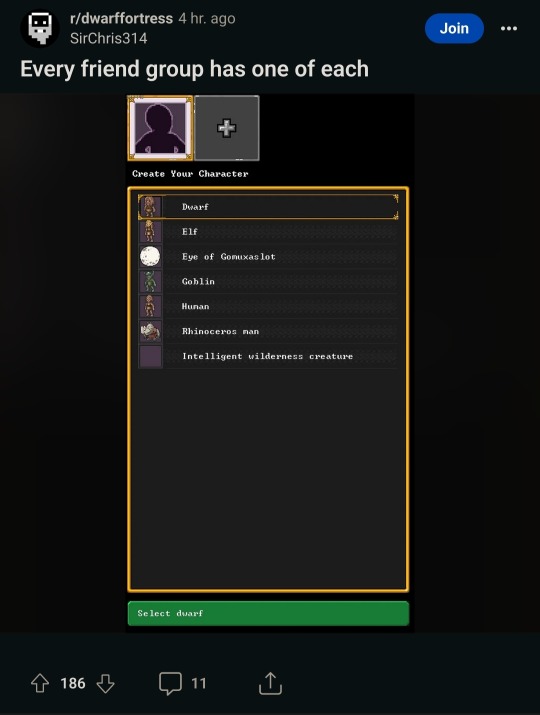
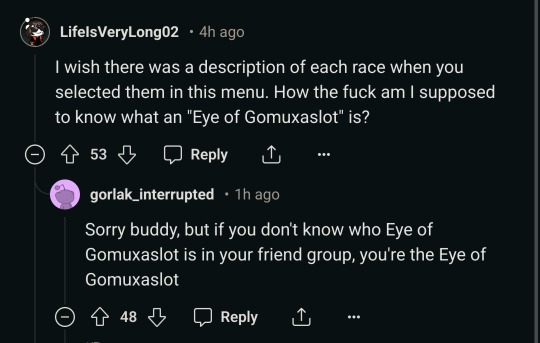
reddit weighing in with the heavy hitting discussion points about the new dwarf fortress update
455 notes
·
View notes
Text
dwarf fortress fucks so hard. my current fort has an occasional patron who is an 86 year old owl lady named 'the frozen one' who spent the first couple of years just perching in trees and watching my dwarves. a two headed fire breathing ettin came to lay siege to the place before I had a proper military established, and while I was freaking out trying to lock doors she just. floated down and tore him in half. when I checked her inventory, all she had was a plain brown dress, socks, shoes, and a pair of gloves. she just ripped him down the middle like a phonebook with her bare talons.
later while checking out other visitors I discovered that almost every bard in the fortress had been her apprentice at some point. eventually she came inside to check out the taverns, and now she just sits around watching performances and getting into arguments about them, feeling nothing. I love her so much.
18K notes
·
View notes
Text
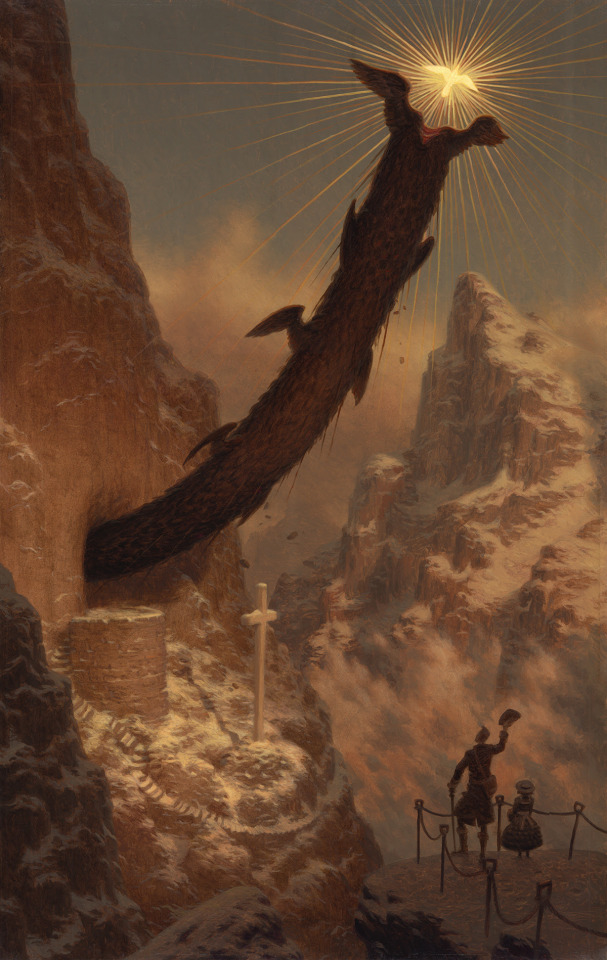
Peter Ferguson (Canadian, 1968) - The Grotto at St. Michel (n.d.)
15K notes
·
View notes
Text
In Houston people breed peacocks and have one of the biggest livestock shows in the world and I don't THINK these things intersect, but I also wouldn't be super surprised if there was also a doppelganger murder cult

sorry it has led to WHAT
8K notes
·
View notes
Text
I need everyone to understand about the fremen.
They do not cry. Ever.
To give water to the dead is the most sacred honor that anyone could give but they rarely and never do that because it's ingrained in them to not waste water from birth. A single tear could mean life and death for them. To give water to the living? Unheard of.
Paul crying over killing Jamis in the book was a moment that astonished the fremen around him. Jessica ponders their reactions and knows that this is a holy moment.
Jessica then forcing Chani to cry for Paul(this was not in the book btw but I love it) is the ultimate betrayal of her autonomy. To force her to give what is essentially a piece of her life to him without her consent is sacrilegious and she knows it.
Water of Life indeed.
8K notes
·
View notes
Text
Gang, I love the Harkonnens. Don’t get me wrong, I don’t endorse the Harknonnens, but there is something really refreshing about unsanitized villains. They aren’t inhuman slaves to Morgoth, they aren’t seeking restitution for some sort of childhood trauma with dalmatians, they are just shitty, weird people and we get to talk about how those people think without trying to excuse it. What really made me fall in love is the sheer alien weirdness of Geidi Prime in the 1984 movie, and if you haven’t seen that I really recommend you check that out. I feel like there should be some sort of trigger warning, but I don’t really know how I’d tag it so use your best discretion. Today I want to zoom in on a Harkonnen scene towards the end of the first book that I personally would like to see in some sort of extended cut. Let’s dig in.
I’m gonna start off by reminding everyone about the most famous scene in the franchise right at the beginning. You know it. The pain box. ‘I hold at your neck the gom jabbar, it’s poison kills only animals.’ Mohaim is testing Paul’s ability to delay gratification by threatening to stab him with a poison needle if he pulls out of the pain box. We've all seen the memes. Now let's talk about Feyd.
In the book, the whole un-drugged gladiator thing was Feyd's own doing. See, Feyd's family doesn't take him very seriously. He's been chosen as the na-Baron because he's got charisma and he'll look like the savior of Arakkis after Rabban and Vladimir, but he’s a big showboater that has all his fights rigged. By conspiring with Thufir to get a real Atredies soldier into the arena with him, he is forcing his family to realize how important he is to them. If something happens to him, everything goes up in smoke. But he's also given a chance to demonstrate that he is competent (even if he's cheating with a poisoned blade and some selective brainwashing of the undrugged slave.) The seduction with Lady Fenrig happens off screen, but I think in both Herbert and Villinueve's telling of the story, both of these show us this conflict Feyd has with the pressures of his family whether they're tests from the Baron or something he does to himself in response to those pressures. Finally, and most importantly to Feyd, when the Baron executes his slavemaster for slipping up with the gladiators, the next slavemaster is on Feyd's payroll.
Years down the line the Baron finds a poison needle hidden on one of his slave boys and immediately knows what's up. Feyd is trying to claim the Baron's seat and he's been planning on it ever since He calls Feyd in to make him watch as his entire staff and harem is executed on a whim. Here's where we get the absolute juicy thematic inversion. This shit makes me salivate in a way I might want to talk with a therapist about. The Baron says ‘Feyd, you know what this whole poison needle business tells me? You don't know where your priorities are. I am working on setting up the Harkonnens for generations to come and you're so laser focused on the inheritance you haven’t put any thought into what comes next. So stop trying to kill me and let's talk about your future.’
Feyd-Rautha is, by Bene Gesserit standards, an animal. In the Villinueve film we kinda skirt around the idea by hearing he's such a weirdo that the nerve induction gets him off, but I think this scene here really helps to illustrate why Paul might be the Kwizatz Haderach and Feyd has no shot. They've both got the genetics and the ability to win over a crowd. Nobody saw it coming, but the Kwizatz Haderach's ultimate purpose is to wage the war that will literally end all wars, you'd think Feyd-Murder-For-Fun-Rautha would be a shoe-in to traumatize humanity to violence once and for all. But the fact he'd be good at it is what makes him ineligible. The Kwizatz Haderach can't be someone who thinks in the short term. If Paul didn't have the big picture in mind, he would have fled from the violent future he saw himself being responsible for. If Feyd were in his shoes, there is no way he could stop from getting lost in the sauce. Feyd orchestrated his own gom jabbar in the attempt on his uncle's life, and he failed. Even if he saw the same path to save humanity, he'd have too many opportunities to indulge his glory seeking.
38 notes
·
View notes
Text
Ah yes Dune, we have witch bitch wizard Mother of the millennium, narrative successor accidental-deliberate genocidal religious despot, eldest daughter traumacore war criminal princess, the only one who can think straight but is doomed by falling in love with the said prophet-despot, 4 year old space cocaine abomination turned cult-leader, and fridged malewife. Family of all time truly.
2K notes
·
View notes
Text
Somehow I have made it this long without realizing that none of the screen adoptions of Dune so much as mention the Butlerian Jihad. Like I guess it's burned into my brain so hard I sort of assumed it was part and parcel of the universe. Don't get me wrong, I think that's probably the first thing you learn if you want to dive deeper into the setting, but it still hits me like if the LotR movies showed us the big flaming eyeball tower and was like ‘Oh, that's why there are bad things, but don't worry, that's just background stuff.’ Yeah, you can understand the movie, but if the story is just like Frodo vs. The Witch King you are losing out on any of the conversation about the corruptive allure of power or theological undertones. So without further ado let's pretend this is for the benefit of interested new fans roped in by the movies and not part of my desperate attempt to silence the howling specters of literary analysis that live in my blood.
The Butlerian Jihad is an event set ~10k years prior to the events of Dune in which humanity won their freedom from the machines that they had enslaved themselves to. As a result, it is a religious taboo to create a machine that thinks like a human. That's frankly the bulk of the information presented by Frank Herbert in the text without dipping into books 7+, but whether or not those are canon is frankly an enormous can of worms, which really makes sense when you consider the size of the worms. But boy howdy, Frank loved his subtext and parallelism. Everyone has a foil character, every theme is hit from multiple angles, and Villinueve has been doing an excellent job of capturing a lot of that in repeated imagery and dialogue. The Butlerian Jihad happens off camera, but it's themes are absolutely critical to the big picture.
The Butlerian Jihad was a holy war. It was not merely a rebellion against the machines, it was a crusade against them. The prohibition against thinking machines isn't just a law, it's in the pan-universal Bible. Absolute psychopath Pieter DeVries himself claps back at the Baron for insinuating he might have a use for a computer, and this is a guy who has been hired specifically for his preternatural absence of morals. Let's hold onto that idea for a minute.
Probably my favorite scene in the first book is the one where planetologist Liet-Kynes is dying out in the desert. As the last of his strength fades to dehydration he hallucinates conversations he had with his father concerning terraforming Arakkis for human habitability. He's told that the means are not complicated. There is already enough water on the planet, the Little Makers just have it all trapped deep underground as part of the sandworm reproductive cycle. You just need to isolate enough water to start irrigating plant life, and once it's established that'll keep the water on the surface on its own. The hard part is making sure everyone on the planet is environmentally conscious enough to foster a developing ecosystem. Nobody can drink any of that water while it's being collected, because they'll just introduce it back into the water cycle where the Little Makers are. It's going to take generations, so that sort of water discipline is going to have to go above and beyond a social convention. People need to be willing to die before they'll take a sip and compromise the plan. Ghost Dad Kynes concludes that the only mechanism in the human experience to enforce this consensus is religion.
In the context of this whole parallelism thing, you have probably noticed that the Butlerian Jihad is not the only holy war in the narrative. Paul sees a new jihad as the only way of creating a future where humans can flourish. Now you might be saying ‘Wait now, Machines. I thought the point of Paul’s holy war was to avenge Leto and disempower established power structures by taking away the control of the spice!’ And you’d be right. The thing is, without getting into spoiler territory, Dune Messiah is not going to be about how everything just gets so much better now that Paul has destroyed the economy, government, and untold billions of human lives. This isn’t the endgame. Dude can see the future and the way he does it involves looking into the past. Paul lives in a society defined by a holy war and his goal is to redefine society.
Putting it all together you can see what I mean about the Butlerian Jihad being essential to the themes even though the story never shows us a thinking machine or a narrative beat where the absence of computers changes the outcome. It helps us see the big picture. I’ve seen a lot of dialogue lately on whether Paul is a tragic hero or a consummate villain and I’m not here to answer that, but I am here to underline the critical detail. Paul intends to be seen as a tyrant. Just like Kynes’ hallucination says, religion is the lever to make a value stick around forever. He wants to traumatize humanity to hate chosen ones and emperors the same way the machines traumatized humanity to change them forever. The Water of Life ritual doesn’t invert his values, it lets him realize these visions of war are the means, not the ends. He is absolutely not happy about it, but this is Paul’s terrible purpose.
178 notes
·
View notes
Text
This is Paul Atredies, the Kwizatz Haderach! He sees the inevitable extinction of mankind that can only be prevented by installing a religious prohibition against centralized authority into the collective subconscious, but can he see why kids love the taste of Cinnamon Toast Crunch?
IT IS RICH IN THE GERIATRIC SPICE
Okay, I was looking for 'the cinnamon sugar swirls in every bite' but that's way closer than anyone else has got
7 notes
·
View notes
Text
An embarrassing share of my family's estate has been redistributed in the acquisition of experimental material. The trappings of modern ethics in the have sought to stymie the progress of science since before the Fall, and the bleeding hearts have only become more agitated ever since the rats started talking. Thus I have made sure to procure written consent and a receipt of payment for each Rattus Faber ‘volunteer’ in my project to forestay scandal.
If there are any truths to be gleaned from my research the foremost among them is this; If you give a rodent a confection the d–ned things will exploit you for all you are worth. What sympathy I might have fostered for these vermin has been whittled down by their extortionate demands. While so much of London subsists on mushroom flour and the questionably sourced meat-like fare purveyed by Mrs. Plenty, these rats eat as well as any in the Shuttered Palace. I would have hoped a few respectable vintages from Greyfields’ cellars would sate a beast’s tastes for luxury, but treacles and marmalade from the Surface? Soon enough the rodents will have enjoyed more of my estate’s largesse than I might ever hope to.
Precious little has been learned, save for the extent of rodential avarice. Let the church say what it will of mankind’s inclination towards sin, had God granted any beast of nature half the faculties of man we would be more likely to see essays in defense of cannibalizing the young rather than the abandonment of the habit. Yes, there is risk inherent to participating in my studies, and yes it is customary that dangerous work be compensated with additional pay, but I cannot help but feel that tradition ought to be relaxed in the new context of the Neath in the same manner we have abandoned customs regarding marriage and romance in the face of irrefutable proof that there are a great deal more categories of personhood than the two commonly accepted on the Surface.
None of them will suffer any permanent harm until my endeavors are successful and in that eventuality the contract guarantees generous provisions to compensate the family of the deceased. And still, they expect hazard pay as though their deaths were permanent affairs. One in every ten poor souls at any textile mill in London can be seen missing eyes or fingers but are still paid a pauper’s wage because their mutilation is left to chance. If a breakthrough is made tomorrow, perhaps one rat in one hundred will have suffered more than a protracted nap before whatever subnatural force set their little hearts beating once more.
While postmortem interviews have proved informative, the stories are all the same. Regardless of the means of death, the subjects report memories of passage on a small boat in dark waters drifting towards a distant shore. Other passengers may or may not be aboard, but descriptions of the gondolier seem to all indicate a common person (granting, of course, allowances for the subjective interpretation of species, rats and humans alike consider the boatman ‘sharp-eyed’ and ‘well-dressed.’) Witnesses corroborate the presence of a chess set, though I’ve nothing but rumors to ascertain its purpose. Elizabeth, is this why you always played like you had something to lose?
–From the Journal of Dr. Thomas Abernathy, May 3, 1868
2 notes
·
View notes
Text



3 body problem (2024-present) cr. david benioff, d.b. weiss, & alexander woo / teaching stone to talk, anne dillard
2K notes
·
View notes
Text
The following exerpts were collected from the notes of Dr. Thomas Abernathy following his disappearance. While they are unaccredited and undated, graphologists unanimously conclude they were written in the doctor's own hand:
In what key are drowned hymns sung?
KAIR-on (n): from ‘charopós’ (G. Keen-eyed)
‘YOU HAVE KNOWN O GILGAMESH, WHAT INTERESTS ME, TO DRINK OF THE WELL OF IMMORTALITY. WHICH MEANS MAKE THE DEAD RISE FROM THEIR GRAVES AND THE PRISONERS FROM THEIR CELLS AND THE SINNERS FROM THEIR SINS. I THINK LOVE'S KISS KILLS OUR HEART OF FLESH.’
Cantigaster-; dreadful name
‘Give me my robe, put on my crown; I have
Immortal longings in me: now no more
The juice of Egypt's grape shall moist this lip:
Yare, yare, good Iras; quick. Methinks I hear
Antony call; I see him rouse himself
To praise my noble act; I hear him mock
The luck of Cesar, which the gods give men
To excuse their after wrath: husband, I come:
Now to that name my courage prove my title!
I am fire and air; my other elements
I give to baser life. So; have you done?
Come then, and take the last warmth of my lips.
Farewell, kind Charmian; Iras, long farewell.’
–Antony & Cleopatra
2 notes
·
View notes
Text
It is seldom heard in our time that the truth is stranger than fiction for much the same reason it is seldom heard: ‘water is wet’ or ‘spiders are best avoided.’ The self-evident does not often bear mentioning. It is for this reason I clarify I do not mean to say ‘the truth is stranger than fiction’ to underscore the sheer alien nature of modern truths, but to lament that I find myself as so many Londoners have become, an inheritor to the House of Usher.
But for divine intercession, there will be no scion to the Abernathy line nor a fortune for one to inherit. A legacy of surgeons and scholars dating back to the twelfth century ends with the last son of Cheterson Hall sparing no expense to trawl the waters of coarse superstition. I make no mirth in winnowing away the hard-won fruits of skepticism on such a venture, but I absolve myself of any sin levied unto me by my ancestors. None among them would have believed in a city stolen by bats and I hope to imagine they would reconsider their biases upon finding themselves living in one.
There are few who sleep well in London, but in my capacity as a physician I assess that my nightmares are short of owing myself a visit to Royal Bethlehem but only just so. I need not even fall asleep to see my Elizabeth awake in her grave, clawing desperately at black earth filling in all around her. Many men of science have fought and failed to break the surly bonds of mortality, but few from circumstances so strange. If souls can be extracted and trafficked, why cannot we at last pay the boatman’s toll when now we share his ports?
–From the Journal of Dr. Thomas Abernathy, April 18, 1868
2 notes
·
View notes
